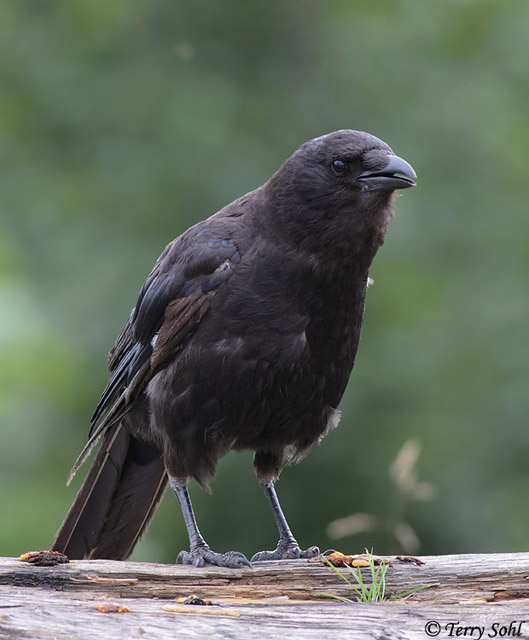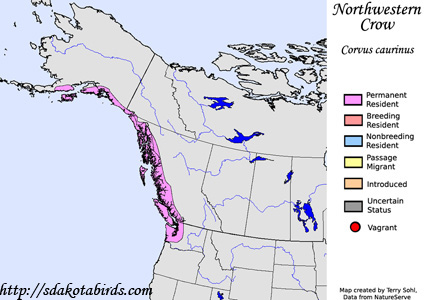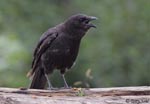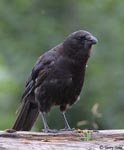| Length: 16 inches | Wingspan: 34 inches | Seasonality: Non-resident in South Dakota |
| ID Keys: Black plumage, very similar to American Crow, only safely distinguished by geographic range | ||
 The
Northwestern Crow is a very close relative of the much more widespread
American Crow. By appearance
alone, it is nearly impossible to differentiate the two species, although
the Northwestern Crow is slightly smaller on average than the American Crow.
The two species are most often distinguished by geographic range, as
Northwestern Crows are only found in coastal areas of Northwest North
America. There are also slight differences in calls between the
species, with the Northwestern Crow having a somewhat hoarser and lower
cawing call than the American Crow. Given the extreme similarity
between Northwestern and American Crows, and given that the two may
interbreed where their ranges overlap, there are many who think the
Northwestern Crow is just a subspecies of the American Crow.
The
Northwestern Crow is a very close relative of the much more widespread
American Crow. By appearance
alone, it is nearly impossible to differentiate the two species, although
the Northwestern Crow is slightly smaller on average than the American Crow.
The two species are most often distinguished by geographic range, as
Northwestern Crows are only found in coastal areas of Northwest North
America. There are also slight differences in calls between the
species, with the Northwestern Crow having a somewhat hoarser and lower
cawing call than the American Crow. Given the extreme similarity
between Northwestern and American Crows, and given that the two may
interbreed where their ranges overlap, there are many who think the
Northwestern Crow is just a subspecies of the American Crow.
Habitat: Found near the coast, often right along the coastline on rocky shorelines, beaches, and wetlands. They will also use habitats near coastlines for foraging.
Diet: Omnivorous. Common food items include crustaceans, mollusks, fish, carrion, insects, eggs, fruits, nuts, seeds, and berries. They will also feed on carrion and refuse.
Behavior: Does most foraging while walking along the ground, but they will use a variety of foraging techniques, dependent upon food opportunities.
Nesting: The nest of a Northwestern Crow is a platform of sticks, mud, weedstems, and bark fibers, placed in the fork of a tree branch, or occasionally on the ground, particularly on offshore islands where predators are not an issue. The female lays four or five eggs, and she alone incubates them. When the eggs hatch, both parents help feed them, and the previous year's young sometimes also assist the parents as "helpers". The young leave the nest after about a month.
Song: Hoarse caw call. Considered to have a hoarser and lower-pitched call than the American Crow on average.
Migration: Considered a permanent resident throughout their range.
Interactive eBird Map: Click here to access an interactive eBird map of Northwestern Crow sightings
Similar Species: Very similar to American Crow, safely told apart only by geographic range.
Conservation Status: There are currently no major conservation concerns for the Northwestern Crow. They are found over a wide geographic range, and are common in many areas. The IUCN lists the Northwestern Crow as a species of "Least Concern".
Further Information: 1) BirdWeb - Northwestern Crow
2) The Pacific Wildlife Foundation - Northwestern Crow
3) AlaskaZoo.org - Northwestern Crow
Photo Information: Photo taken in August 2010 near Homer, Alaska - Terry Sohl
| Click below for a higher-resolution map |
 |
| South Dakota Status: Non-resident in South Dakota |
Additional Northwestern Crow Photos
Click for a higher-resolution version of these photos





